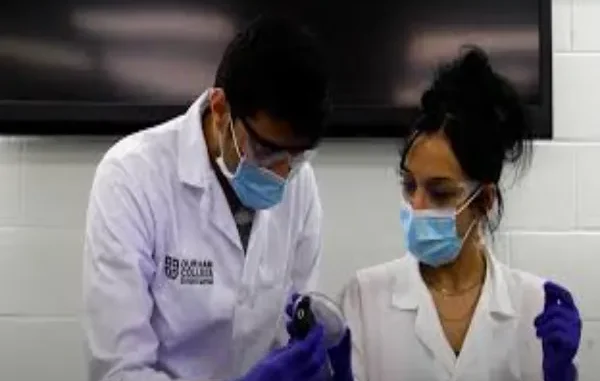
Suggested URL: plan-fast-track-into-entry-level-biotech-online
Switching into biotech may sound tough, but the field welcomes people from diverse backgrounds.
Career changers find clear pathways if they know where to look and which courses to take. So, if you’re curious how to stack the odds in your favor, stick around to find your own shortcut into entry-level biotech.

Picking Your First Biotech Role: Where Newcomers Start
Most new entrants start in lab technician, quality assurance, or clinical research support roles. These jobs welcome people with varied backgrounds. Lab tech positions focus on prepping samples and following protocols. Quality assurance keeps processes consistent, so people with detail-oriented mindsets often fit right in. Clinical research support primarily involves paperwork, data management, and compliance.
Job ads list plenty of entry-level spots. You’ll spot titles like “Lab Assistant,” “QA Technician,” or “Clinical Trial Associate.” Look for employers that mention “training provided” or “no prior lab experience needed.” Companies value reliability and curiosity. You don’t need years in the field.
Choosing Online Courses That Employers Respect
Basic biology courses from universities or well-known platforms build the foundation for any biotech role. Introductory classes in cell biology, genetics, and biochemistry give you the science employers expect.
A course with lab components, even virtual ones, helps you prepare for a career in biology by showing you how experiments work. Look for options that offer digital lab simulations or practical modules. Certificates from respected sources carry more weight with hiring managers.
Some employers mention preferred providers in their job ads. Pay attention to these details. Picking the right course means you build knowledge that translates into job interviews. The right coursework proves you’re serious and ready to learn. This puts you a step ahead of other entry-level applicants.
A clear role target shapes what skills to learn and what online coursework to choose. That way, you waste less time and money. So, picking a starting point means getting your foot in the right door from the beginning.
Micro-Credentials That Speed Up Your Entry
Short, focused credentials fill the gaps that a general biology course might miss. For biotech jobs, micro-credentials in Good Laboratory Practice (GLP), Good Clinical Practice (GCP), or laboratory safety are highly valued by employers. These topics cover the “rules of the road” for most entry-level positions.
Online providers offer these courses in a self-paced format. Completion often results in a digital badge or certificate, which you can list on your resume or LinkedIn profile. GLP and GCP, in particular, signal that you know how to work under regulated conditions.
Some companies offer free micro-credentials if you apply for their training pipelines. Watch for industry-sponsored programs or local biotech organizations. Adding even one or two of these quick certifications can turn a resume from basic to qualified, showing you’ve gone beyond general coursework and picked up relevant industry know-how.
Getting Practical Skills Without a Campus Lab
Hands-on practice matters, even for entry-level biotech jobs, and goes hand in hand with other must-haves, like a good resume. Virtual lab platforms, such as Labster and HHMI Biointeractive, allow you to run experiments directly from your computer. It’s the same thing as learning to ride a bike with training wheels before heading out on real roads.
Community labs, often referred to as biohacker or makerspaces, welcome newcomers. These spaces offer supervised access to real lab tools. Some run weekend workshops or evening classes. That’s perfect for adults who work or study during the week.
Open-source projects and citizen science initiatives allow you to join research efforts from the comfort of your own home. Folding@home or iNaturalist, for example, involve real-world data and build practical skills.
Even at a time when automation is influencing various aspects of progress in the field, practical exposure, whether online or local, still shows employers you’re not just a textbook learner. Even one or two experiences can help you answer technical interview questions with real examples, making you much more memorable to hiring managers.
Building a Portfolio That Shows You’re Job-Ready
A small project portfolio can set you apart. For example, keep a digital notebook with summaries of online labs, micro-credential certificates, and any community lab projects you finish. Include screenshots, results, and brief reflections on what you learned. It’s like assembling a highlight reel that shows your effort and growth.
Create a simple website or a LinkedIn portfolio section to showcase your work. If you participate in a citizen science project, track your contributions and outcomes. For data-focused roles, analyze a public biotech dataset and post your findings.
Employers like seeing initiative. Even small projects, like designing a sample tracking spreadsheet or practicing basic pipetting in a community lab, show you can take action without constant supervision. A clear portfolio gives hiring managers something concrete to discuss. It also helps you remember details that make interview answers stronger and more confident.
The Bottom Line
Switching into biotech is within reach for motivated career changers. Clear targets, online coursework, and a hands-on project portfolio lay the groundwork for success.
Smart choices now speed up your path into the field. A practical, focused approach means you arrive prepared and ready to tackle entry-level biotech work.
Leave a Reply